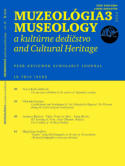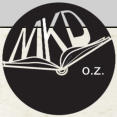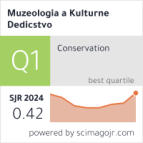

MUZEOLÓGIA
MUSEOLOGY
a kultúrne dedičstvo
and Cultural Heritage

News
Journal Muzeológia a
kultúrne dedičstvo -
Museology and Cultural
Heritage:
SJR 2024: 0,424 (Q1)
Museology SJR rank: 8/83 (Q1) Conservation SJR rank: 11/103 (Q1)JIF WoS 2023: 0,6
JCI WoS 2023: 1,28, Q1 ESCI: 49/411 (Q1)New issue
Muzeológia a kultúrne
dedičstvo 1/2025
online New volume Studia Museologica Slovaca, vol. 8 (2024) online New volume Populačné štúdie Slovenska 17 (2024) onlineNew book
P. Tišliar (ed.). Osobnosti uměleckoprůmyslového muzejnictví (2025). online
Contents 3/2022
Title: The museum exhibition in the context of dispositive analysis
Abstract: : The aim of this study is to propose and present a suitable methodological framework based on the principle of discourse
analysis, which would be suitable for the implementation of research on the museum environment, in particular museum exhibitions
and their narratives. The potential of the dispositive analysis of the museum phenomenon is enormous, but the elaboration of this
methodology in the context of museum research in our environment is lacking. This study aims to add to this underdeveloped area and
provide readers and researchers with key information concerning the possibilities and uses of this methodology. As a suitable
methodological tool, the study chooses dispositive analysis, which has the advantage of allowing the analysis of materializations in
addition to the discourse plane, which is an advantage for the analysis of exhibitions and the exhibits housed therein. Dispositive
analysis, which in the study is primarily based on S. Jäger’s approach, enables the examination of materializations without overlooking
the role of visitors and the broader context of the exhibition, which, by its very nature of membership of a cultural institution, is always
discursively conditioned. The relationship between the museum and discursive reality is thus a thematic part of the study, as is the
exploration of the topics of discourse (Foucault) and the dispositive.
Author: Kolaříková Veronika
Publication order reference: Masaryk University, Faculty of Education, Department of Social Education, Czech Republic, e-mail:
kolarikova.veronika@mail.muni.cz, https://orcid.org/0000-0001-7726-6913
Source: Muzeológia a kultúrne dedičstvo, year: 2022, vol.: 10, number: 3, pages: 5-31.
Key words: Museum exhibition, narrative, discourse, dispositive, dispositive analysis, Foucault, Jäger
Language: English
online full-text PDF
DOI: 10.46284/mkd.2022.10.3.1
Title: Establishment and development of the Zakarpattia Regional Art Museum during the Soviet and
post-Soviet period
Abstract: The article deals with the preconditions for the formation and stages of establishment of the Zakarpattia Regional Art
Museum in Uzhhorod as one of the main cultural and historical centres in the region of scientific, educational and artistic direction. It
traces the historical milestones of the cultural and national renaissance in Zakarpattia, which was annexed to the Czechoslovak
Republic under the name of Carpathian Ruthenia in 1919 after the collapse of the Austro-Hungarian monarchy, as well as in the post-
war period during the Soviet era. The preconditions for the opening of the museum in Uzhhorod and the ways in which the first
museum collections were formed have been studied; the activity of persons who played key roles in the formation of the art museum is
described.
Author: Kuzma Viktoriia
Publication order reference: Uzhhorod National Universit, Faculty of History and International Relations, 3, Narodna Squar, 88000
Uzhhorod , Ukraine, e-mail: viktoria.kuzma@uzhnu.edu.ua, https://orcid.org/0000-0002-0291-643X
Source: Muzeológia a kultúrne dedičstvo, year: 2022, vol.: 10, number: 3, pages: 33-42.
Keywords: : Carpathian Ruthenia, union of artists, zemstvo art gallery, zemstvo museum, art museum
Language: English
online full-text PDF
DOI: 10.46284/mkd.2022.10.3.2
Title: 3D Scanning of Porto Alegre Museum Artifacts: The Crockery of the Rocco Bakery
Abstract: Antiques usually require careful handling, so these objects cannot be made available to the general public and are handled
only by restoration specialists. This article focuses on the preservation of antiquities in terms of cultural heritage and the availability of
these objects for access by visitors, it describes and evaluates the development of a method to support the digitisation of objects
considered solids of revolution. The artifacts were provided by the Museu Joaquim José Felizardo in the city of Porto Alegre, Brazil,
and were used to set the table in the former Confeitaria Rocco (bakery). The 3D process consisted of the following steps: laser
scanning, data processing of the coordinates obtained from the surface of the object into point clouds, creation of the virtual model,
creation of a physical model using additive manufacturing, and evaluation of the physical model in comparison with the original artifact.
The obtained results show that highly accurate models can be created using the proposed method. Therefore, virtual data can be
obtained for the conservation, restoration and creation of replicas for studies and accessibility.
Author: Richetti Andresa, da Silva Fabio Pinto, Roldo Liane
Publication order reference: Billy Blue College of Design, Torrens University, Level 1/46-52 Mountain St, Ultimo, Postcode 2007,
Sydney, Australia, e-mail: andresarichetti@yahoo.com.br, https://orcid.org/0000-0003-1664-3548; Federal University of Rio Grande do
Sul, Praça Argentina, s/n - Prédio Château, Centro Histórico, CEP 90040020, Porto Alegre, Brazil, e-mail: fabio.silva@ufrgs.br,
https://orcid.org/0000-0001-9349-5601; Faculty of Maritime Studies, University of Split, Rudera Boškovića 37, HR 21000, Split,
Croatia, e-mail: lroldo@pfst.hr, https://orcid.org/0000-0002-0301-8631
Source: Muzeológia a kultúrne dedičstvo, year: 2022, vol.: 10, number: 3, pages: 43-59.
Keywords: 3D digitisation, cultural heritage, historical artifacts, solids of revolution
Language: English
online full-text PDF
DOI: 10.46284/mkd.2022.10.3.3
Title: “Games” using old photographs in the time of the pandemic: Archival photographs in museum
education
Abstract: The purpose of the article is to show what knowledge on the ludic culture of Cieszyn Silesian residents at the turn of the
nineteenth and twentieth centuries can be obtained through the resources of the Photography Section of the Museum of Cieszyn
Silesia. The project required both preliminary research and an analysis of archival photographs. The research questions regarded the
usefulness of old photographs depicting past games in the preparation of both online and offline museum classes on the local cultural
heritage. In the article, the author discusses photographs documenting past toys and pastimes, divided into 10 thematic groups, and
presents outlines of lesson scripts as well as other museum activities prepared on their basis. The research conducted during the
lockdown caused by the COVID-19 pandemic required netnographic methods and the analysis of historical sources, while the
application of methods of design thinking made it possible to prepare scripts of museum classes.
Author: Szalbot Magdalena
Publication order reference: The University of Silesia in Katowice, Institute of Culture Studie, ul. Bielska 62, 43-400 Cieszyn, Polska,
e-mail: magdalena.szalbot@us.edu.pl, https://orcid.org/0000-0002-3915-2541
Source: Muzeológia a kultúrne dedičstvo, year: 2022, vol.: 10, number: 3, pages: 61-79.
Keywords: old photography, museum online, cultural heritage in lockdown, participatory museum, reconstruction of past games and
toys
Language: English
online full-text PDF
DOI: 10.46284/mkd.2021.10.4.4
Articles (Abstracts)

Full-text version
DOI:10.46284/mkd.2022.10.3.0
ISSN 1339-2204
eISSN 2453-9759
Vol. 10 (2022), No. Is. 3



























